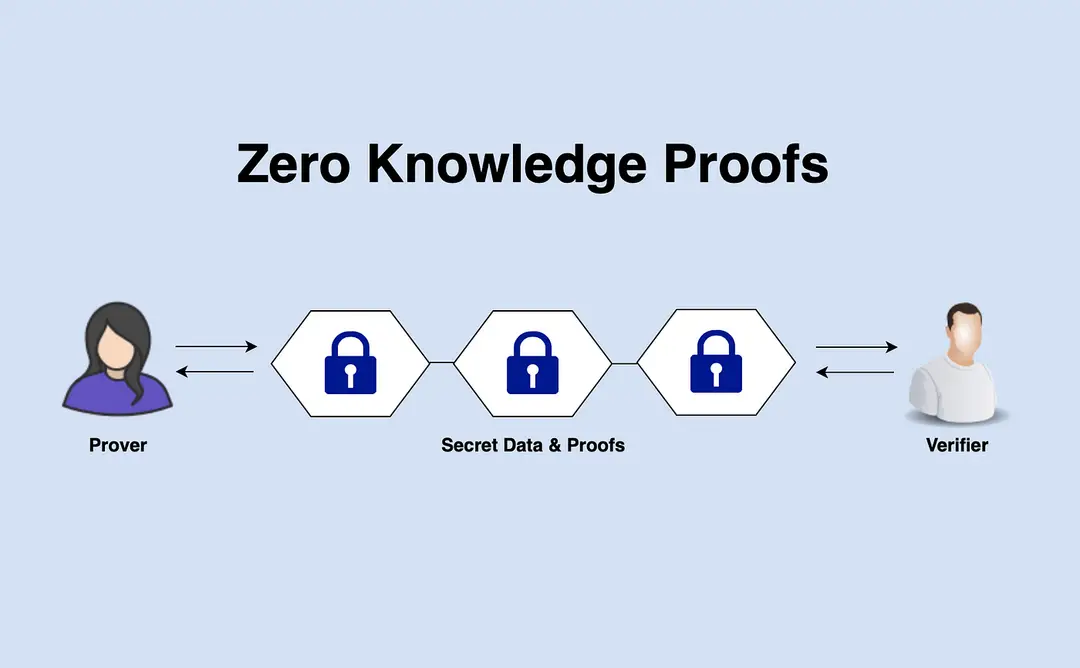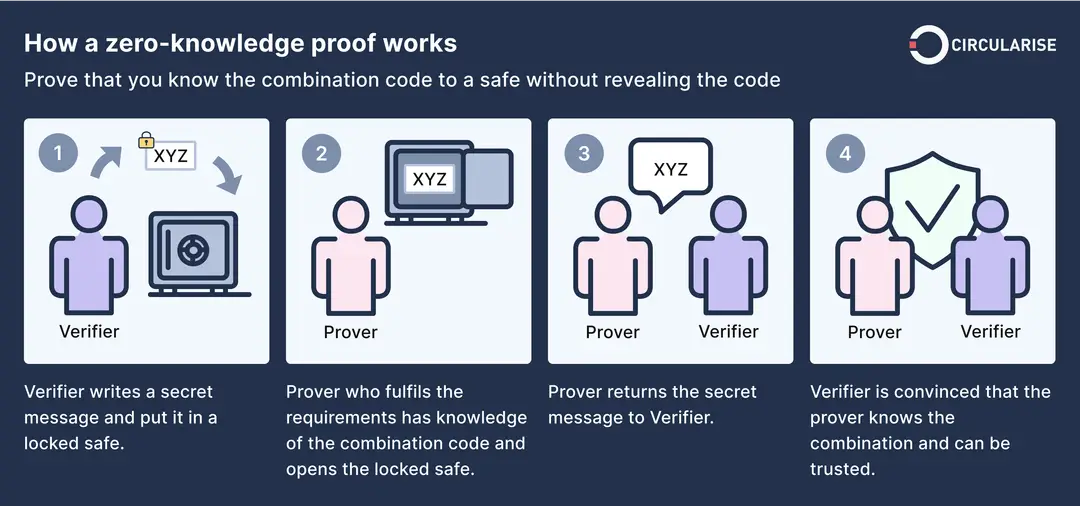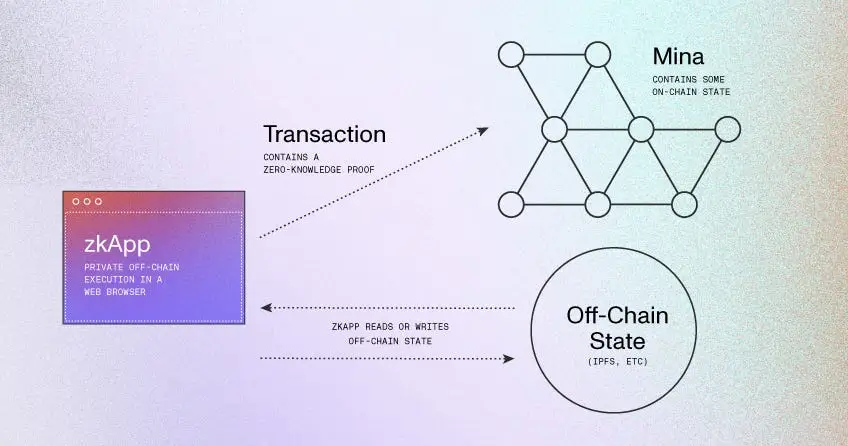Back
Zero-knowledge proof
Linea
By HackQuest
Jun 1,20244 min readWelcome to the Web3 world, where digital finance and applications are shown in a revolutionary way through the fusion of blockchain technology, cryptocurrencies, and a pioneering spirit. Are you overwhelmed by the wealth of terms in the Web3 world that you don’t understand? Are those slangs barriers for you to learn about Web3? Don’t worry! We’re here to explain the obscure terms to guide your learning. Today, we're diving into an exciting development in the world of Web3: [Zero-knowledge proof].
Overview
A zero-knowledge (ZK) proof is a type of cryptographic protocol that allows one party (the prover) to prove to another (the verifier) the truth of a certain assertion without revealing any additional information about the assertion itself.
The concept was first introduced in the early 1980s by researchers Shafi Goldwasser, Silvio Micali, and Charles Rackoff. The primary objective of a ZK-proof is to convince the verifier of the truthfulness of a claim without providing any information other than the fact that the claim is indeed true.

Source: What are Zero Knowledge Proofs?
An effective zero-knowledge proof must meet three key criteria:
1.Completeness: If the claim is true and both parties follow the protocol, the verifier should be convinced of the claim's truth with a high probability.
2.Soundness: If the claim is false, it should be highly improbable for any prover to convince the verifier that it is true.
3.Zero-knowledge: The verifier learns nothing more than the veracity of the statement from the interaction with the prover, maintaining the secrecy of any other information.
Types of ZK Proof
Interactive Zero-Knowledge Proofs
Interactive ZK proofs involve a series of exchanges between the prover and the verifier to establish the proof.
Non-Interactive Zero-Knowledge Proofs
Non-interactive ZK proofs allow for the verification of a claim in a single, straightforward step.
Statistical Zero-Knowledge Proofs
Statistical zero-knowledge proofs achieve computational soundness and are characterized by a minimal probability of error.
Proof-of-Knowledge (PoK)
Proof-of-Knowledge is a type of zero-knowledge proof that demonstrates the prover's possession of specific information pertinent to the assertion.
Proofs of Shuffle and Range
These types of zero-knowledge proofs are typically used in scenarios like electronic voting and transactions that prioritize privacy.
Sigma Protocols
Sigma protocols are a category of zero-knowledge proofs that follow a three-phase process: commitment, challenge, and response.
Bulletproofs
Bulletproofs are specialized for efficient range verification of large data sets, enhancing both speed and scalability.
How It Works
At a fundamental level, a zero-knowledge proof operates by the verifier requesting the prover to execute a series of tasks that can accurately be performed only if the prover possesses specific knowledge about the underlying data. If the prover is merely guessing the outcomes of these tasks, the verifier's tests will, with high probability, eventually expose their lack of knowledge.

The three essential attributes of a zero-knowledge proof are:
1.Completeness: If a claim is true, a credible verifier will be convinced by a credible prover that they have knowledge of the correct input.
2.Soundness: If a claim is false, no deceitful prover can convince an honest verifier that they know the correct input.
3.Zero-knowledge: If the claim is true, the verifier gains no other knowledge from the prover besides the fact that the claim is indeed true.
ZK Proof Use Cases
Private Transactions
Zero-knowledge proofs (ZKPs) are utilized by blockchain platforms like Zcash to facilitate transactions that protect user privacy, concealing details such as the amount of money, and the identities of the sender and receiver.
Verifiable Computations
Decentralized oracle networks, which supply smart contracts with external data and computational resources, use ZKPs to validate certain facts about data points off-chain, without exposing the underlying data on the blockchain.
Highly Scalable and Secure Layer 2s
Methods like zk-Rollups, Validiums, and Volitions use verifiable computations to enhance the security and scalability of layer 2 solutions. By using layer 1 blockchains like Ethereum for final settlements, these technologies offer decentralized applications (dApps) and users quicker and more efficient transaction capabilities.
Decentralized Identity and Authentication
Zero-knowledge proofs support identity management systems that allow individuals to prove aspects of their identity without compromising their personal data. For instance, ZKP-based identity solutions could verify someone’s citizenship without requiring them to disclose their passport information.

Source: Medium
Conclusion
In summary, zero-knowledge proofs (ZKPs) stand as a transformative force in the landscape of Web3, bringing a heightened level of privacy and security to various blockchain applications. From their inception in the early 1980s, ZKPs have evolved to serve not only as foundational elements in privacy-preserving transactions but also as integral components in systems requiring secure and verifiable computations. The versatility of ZKPs is evident across a spectrum of applications, from enhancing the scalability of blockchain networks with techniques like zk-Rollups to bolstering decentralized identity verification systems that protect user privacy. As we explore and implement these advanced cryptographic protocols, we continue to push the boundaries of what's possible in digital finance and beyond, ensuring that blockchain technology not only grows in capability but also in trust and accessibility. Zero-knowledge proofs are indeed a cornerstone in the ongoing evolution of the blockchain, ensuring that as the digital landscape expands, it does so with integrity and security at its core.